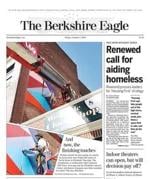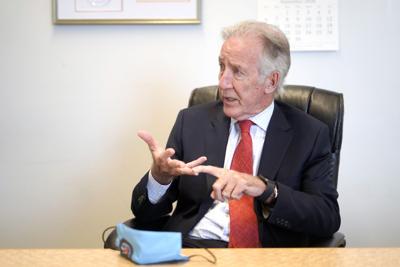The $9.75 billion infrastructure bond bill that cleared the Transportation Committee does not include any language creating a new rail authority to oversee a passenger train extension to Western Massachusetts, bucking a prediction U.S. Rep. Richard Neal, D-Springfield, made last month when he and state officials announced a historic agreement to advance the project.
Lawmakers on the panel packed $47 million in additional spending on top of the bottom line in the bill Gov. Charlie Baker filed (H 4561), calling for increased investments in regional transit authorities and $25 million in grants aimed at reducing roadway congestion by promoting carpooling and running shuttles.
But neither the text of the redraft nor a bullet-point summary a committee aide produced make any reference to east-west rail or launching a new authority.
In April, Neal and Gov. Charlie Baker announced they had agreed on a path forward to extend passenger rail from Worcester — the current western terminus for the MBTA’s commuter rail network — to Springfield and Pittsfield. Neal said the plans hinged on standing up a new rail authority in the pending infrastructure bond bill as well as seeking a dedicated funding stream tied to the federal infrastructure law steering billions to Massachusetts.
Lawmakers could tack on language creating the authority during the bill’s journey through the House and Senate.
The Boston-based MBTA current oversees the core bus and subway systems as well as a commuter rail network that runs north, south and west of the city.
The panel’s version of Baker’s infrastructure bond bill also includes language that would require the MBTA to provide “adequate parking alternatives” for commuters whenever the agency is demolishing or reconstructing a garage or lot it controls. It additionally pursues reforms to the state’s “Dig Safe” laws that would “ensure all underground utilities are properly accounted for at all relevant stages of a project that will require excavation,” according to the committee’s summary.
Otherwise, the legislation that cleared its first committee hurdle mostly aligns with the measure Baker proposed in March to maximize the impact of a new federal infrastructure law.
The bottom line represents a combination of federal and state spending. According to the committee summary, the bill calls for using $3.5 billion to compete for federal grants as well as steering $2.8 billion to federal highway projects, $1.35 billion to state roads, bridges and routes, $1.38 billion to MBTA modernization, and $145 million to multi-modal projects and shared use paths.
Other areas of funding include $114 million for aeronautics safety and modernization, $200 million for state emissions reduction programs including expansion of electric vehicle charging infrastructure, $82 million for an industrial rail access program and $64.9 million for regional transit authorities.
Like Baker’s bill, the committee redraft includes language giving the Department of Transportation authority to use flashing blue lights as a safety measure in work zones where law enforcement personnel are on site. It would also empower MassDOT to deploy “A+B bidding” that considers both project cost and the amount of time required.
Legislative leaders had not yet assigned the Transportation Committee’s version of the bill a new number nor sent it forward to the next committee for review as of Monday afternoon.
”The way this works is the state authorizes, the state moves forward, the state spends, and the federal government reimburses,” Baker said when he outlined his bill in March. “It’s critical for us to get this legislation passed as quickly as we possibly can, which will then enable us to move forward aggressively putting this $9.7 billion series of projects to work throughout Massachusetts over the next five years.”
Once it reaches the floor, lawmakers will likely push to pack additional spending and earmarks for their districts into the proposal.
A spokesperson for House Speaker Ronald Mariano said Monday that the infrastructure bill will not feature during formal sessions scheduled for Wednesday and Thursday.


